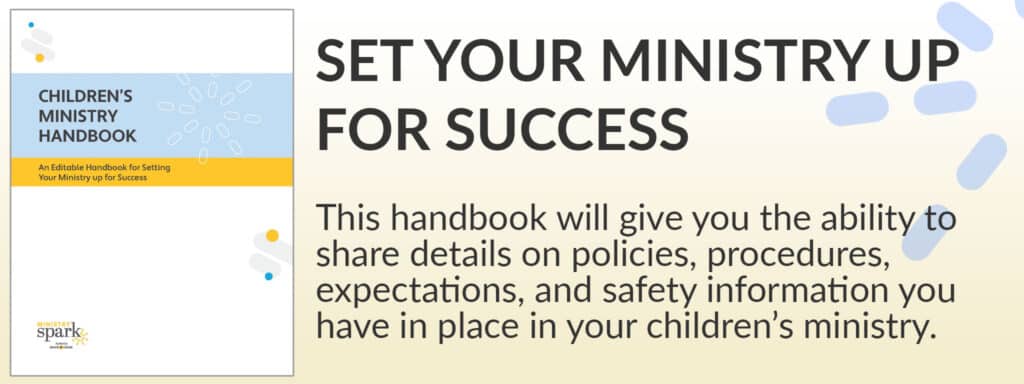Note from the Editor: This article was transcribed from portions of the Ministry Spark webinar: Creating a Vibrant Special Needs Ministry. You can watch the full webinar here.
I am the executive director and founder of Soar Special Needs. SOAR stands for Special Opportunities, Abilities, and Relationships. And we’re a nonprofit that helps answer three of the main questions every parent with an individual with disability has.
First, will my child ever be able to provide for themselves?
Secondly, who will take care of my child once I’m gone?
Thirdly, who will take care of me as a parent or a caregiver?
Those are questions that keep these families awake at night. If you are a parent of a neurotypical child, you are less likely to have to dream of those questions.
And, frequently, the church isn’t there to help them through these.
It says we’re to go into all the world and share the gospel. Nowhere does it say only those with an IQ over 70, only those who are able to walk, or only those who are able to speak.
It says all.
Everyone calls me Doc. I’m a pediatric ER doctor, so it fits. I’ve also been a children’s pastor in a ministry where we grew to over a thousand kids in about three years. And during that time, I was blessed with my second son Mark.
Unfortunately, today only 11% of churches would accept my son. You see, my son Mark had Dravet Syndrome, a very rare genetic seizure disorder and autism. Only 11% of churches, parishes, and synagogues in the United States today welcome families with disabilities. 89% turn them away and say, you’re not welcome.
It’s not right. And most importantly, it’s not biblical.
But here’s the bottom line. You are unable to be a world-class children’s ministry unless you welcome families with disabilities. It just cannot happen otherwise.


The Hard Statistics
Today, 90% of individuals with special needs in the United States do not attend church. It’s the largest unmet people group in the United States. There are three reasons why these families don’t attend church.
- They’re afraid their child is not going to be taken care of. We know that’s right because we already said only 11% of churches know what they’re doing.
- Secondly, they know the burden they carry, and they don’t want to be a burden to the church.
- And third, they’ve been asked to leave the church too many times before, and they’re afraid that God has given up on them.
Church, we must do better.
According to the CDC today, 26% of the US population has a diagnosis of special needs or disability making them the largest minority group in the United States. And by this time next year, that number’s estimated to be 37%, well over one-third of the country.
The divorce rate for families with disabilities is 90%. You add to that a medical diagnosis—like diabetes or seizures—and it jumps to 95%. It’s unimaginable. Why? Because the stress of being a parent is 24/7/365. You never get a break. And the church isn’t there to help these families.
75% of Jesus’ miracles listed in the Bible were done for individuals with special needs. He healed the lame, He healed the blind, He healed the deaf. Remember that every individual with special needs is created the image and likeness of God. There is no difference. God created them on purpose, for a purpose.

The Biblical Purpose
So, why do we need to do a special needs ministry? Because it is a biblical mandate.
Luke 14: 12-14 NIV says, “Then Jesus said to his host, “When you give a luncheon or dinner, do not invite your friends, your brothers or sisters, your relatives, or your rich neighbors; if you do, they may invite you back and so you will be repaid. But when you give a banquet, invite the poor, the crippled, the lame, the blind, and you will be blessed. Although they cannot repay you, you will be repaid at the resurrection of the righteous.”
This is the model of inclusion. Why? Because God’s Church needs those with disabilities just as much as those with disabilities need the Church.
We need to minister to and integrate those with special needs into the life of the church and give them opportunities to actively serve. You know, when I see and read the Great Commission, I don’t see any disclaimers on who should be included. It says we’re to go into all the world and share the gospel. No where does it say only those with an IQ over 70, only those who are able to walk, or only those who are able to speak. It says all.
It’s ministry with and ministry by. It’s where everyone is present, invited, welcomed, known, accepted, supported, cared for, befriended, needed, and loved.
3 Ways to Minister through Classrooms
There are three different ways that we can set up classrooms. There’s inclusion, segregation, and integration.
It’s ministry with and ministry by. It’s where everyone is present, invited, welcomed, known, accepted, supported, cared for, befriended, needed, and loved.
- Let’s start by talking about inclusion. Pure inclusion is where the individual is in their typical class with a one-on-one buddy or an aide. They’re a guide on the side who can help them with everything. These classrooms are where all students are vital members of the class. They feel connected to their peers, and they have a meaningful general curriculum, but they have additional support to help them succeed. And, and so they’re in their age appropriate or their developmentally appropriate classroom.
- Our second type is a self-contained or segregated classroom. This means having a special class for all the individuals with special needs and no neurotypical peers. This is best suited for those individuals who do not do well in or benefit from the typical classroom. So, when in a children’s ministry setting, we’re only talking about 5-10% of kids here.
- The third is a combination where children with special needs have their own classroom, but it’s in with everybody else. They can still be with all their friends in the beginning for worship, etc., but they’ve got their special learning time that can be tailored for them and really help them in learning everything that they need to as they go through all that.
With all of these types, it may also be great to have a sensory room for children to go to when they feel overwhelmed.
Getting the Right Volunteers
I think the four most important letters in the alphabet are I-C-N-U (I see in you). And let me tell you how this works. Each and every one of you, your main job every Sunday is not making sure all the volunteers are in place, not making sure all the kids are in their ministry, not making sure everything is good, the curriculum’s ready, and you’ve got your lesson down. Your most important job is observing every single person who comes into your ministry area.
Because just about every church I know follows an 80-20 rule, 80% of the work’s done by 20% of the people.
That tells me 80% of your church walk into your service, sit there, collect dust during the message, stand up, knock off the dust, and walk out to get their kids. That’s who we have to go after. Go up to them and say something like this:
I-C-N-U: I See in You
“I’ve been observing you the last couple of weeks. And I just have to tell you, I see in you. I see in you someone who has an amazing heart for people. I see in you someone who loves people. And I’ve got a simple question for you. Can you be a friend?”
Guess what! I’ve never had anyone tell me, no, they can’t be a friend. Ask them to pray about it for a couple of weeks. I’ve also never had anyone tell me, no, they won’t pray. Ask them to search their heart and see if they could be a friend to someone with special needs. Tell them you’ll train them and help them if the answer is yes, but first ask them to pray.
And if they come back with a yes, work with them. Don’t make them serve more than they can and appreciate them for what they can give.
For your first training, call it anything but a training. And if you want people to show up, bring snacks. Play a quick game, share a quick word, and then get into it. Be sure to end your time with fellowship.
This is the beginning of something beautiful in your ministry when you love God and love people really well.
HeartShaper
With our easy-to-follow lessons, teachers can focus on kids’ unique needs while helping them hide God’s Word in their hearts.










